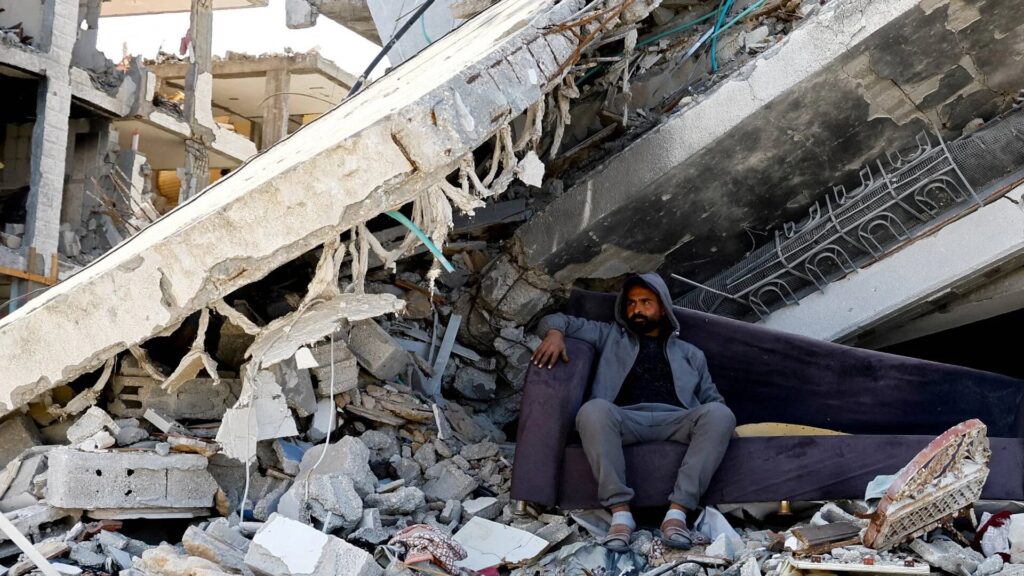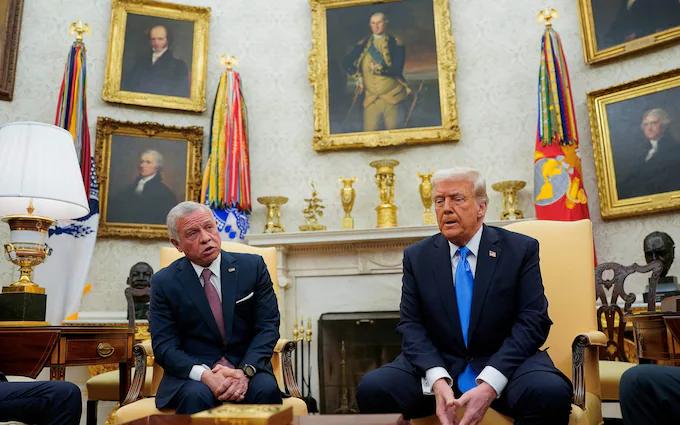Riyadh, Saudi Arabia – In a significant diplomatic gathering, Arab leaders from across the Middle East have assembled in Riyadh to formulate a unified response to U.S. President Donald Trump’s recent proposal concerning the Gaza Strip. Dubbed the “Riviera of the Middle East,” Trump’s plan suggests U.S. control over Gaza, the displacement of its Palestinian residents, and the transformation of the area into a tourist destination.

The proposal has sparked widespread condemnation and raised concerns about regional stability, the future of the Palestinian people, and the potential violation of international laws protecting displaced populations. The Riyadh summit marks a crucial moment for Arab nations to counter what they see as an unjust plan that disregards the Palestinian right to self-determination.
Trump’s Controversial Proposal
Earlier this month, President Trump, alongside Israeli Prime Minister Benjamin Netanyahu, unveiled a plan that aims to “take over” the Gaza Strip. The proposal involves demolishing existing structures, relocating over two million Palestinian residents to neighboring countries, and redeveloping the coastal enclave into a resort destination.
According to Trump, the initiative would unlock Gaza’s potential, turning it into a luxurious hub for tourism and investment. He argued that the Palestinian people could benefit economically by relocating elsewhere, where they would receive financial aid and assistance in integrating into host countries.
However, critics argue that this plan blatantly ignores the deep-rooted history of the Palestinian people in Gaza. For generations, Gaza has been home to Palestinian families, many of whom were already displaced from other parts of historical Palestine. The proposal has been called an “ethnic cleansing plan in disguise” by human rights organizations, warning that forced displacement violates international law.
Arab Nations Unite in Opposition
The announcement of the proposal has been met with swift and strong reactions from Arab nations. Leaders from Gulf states, Egypt, Jordan, and other countries have expressed deep concerns over the forced displacement of Palestinians and the potential destabilization of the region.
Egypt, which shares a border with Gaza, has voiced alarm over the possible influx of displaced Palestinians into its territory. Egyptian officials have warned that such a move could create new security risks and worsen humanitarian challenges. Jordan, which already hosts a large Palestinian refugee population, is equally concerned about the regional implications of the plan.
Saudi Arabia, a key power in the Middle East, has taken the lead in organizing the Riyadh summit. Crown Prince Mohammed bin Salman has called for a unified Arab response to counter the proposal. According to sources within the Saudi government, leaders at the summit are discussing ways to “develop a long-term solution for Gaza that prioritizes Palestinian rights and sovereignty.”
Saudi Arabia’s role in the issue is particularly notable, given its recent moves toward improving ties with Israel. While the kingdom has expressed openness to diplomatic engagement, it has also made clear that any solution must align with Palestinian interests and international law.
Challenges in Formulating an Alternative Plan
While Arab leaders share a common stance in rejecting Trump’s proposal, they face significant challenges in developing a viable alternative. One of the primary concerns is the massive financial commitment required to rebuild Gaza’s infrastructure. Years of conflict have left the enclave devastated, with widespread poverty, limited access to clean water and electricity, and a fragile healthcare system. Rebuilding Gaza would require an estimated $50 billion, a figure that presents a challenge even for wealthy Gulf nations.
Another key issue is governance. The Palestinian political landscape remains deeply divided, with factions such as Hamas and Fatah struggling to find common ground. Any new plan for Gaza would require agreement among Palestinian leaders, which has historically been difficult to achieve.
Moreover, Israel’s stance remains a significant obstacle. Prime Minister Netanyahu has made it clear that Israel will not accept any proposal that threatens its security. There are concerns that even if Arab nations put forward an alternative plan, it could be met with resistance from the Israeli government, which holds military control over the region.
International Reactions to the Proposal
The global community has also weighed in on Trump’s plan, with many governments and international organizations strongly criticizing it. The European Union, for example, has condemned the proposal as a violation of human rights, arguing that forced displacement cannot be considered a legitimate solution.
Josep Borrell, the former High Representative for Foreign Affairs and Security Policy of the EU, described Trump’s plan as a “war crime under international law.” He emphasized that the international community has a responsibility to prevent the forced displacement of vulnerable populations.
In the United Nations, several member states have called for emergency meetings to address the issue. The UN’s humanitarian agencies have warned that displacing two million Palestinians would create an unprecedented refugee crisis, straining neighboring countries and international aid organizations.
In the United States, reactions have been mixed. Some conservative policymakers support Trump’s proposal, seeing it as an opportunity to reshape the Middle East’s political landscape. However, others, including some Democrats and human rights advocates, have denounced the plan as reckless and inhumane. Critics argue that it would only further escalate tensions in the region and damage America’s credibility in international diplomacy.
Looking Ahead: What’s Next for Gaza?
The Riyadh summit represents a critical moment in determining the future of Gaza and the broader Palestinian issue. As discussions continue, the international community is closely monitoring the outcomes, hoping for a resolution that promotes peace, stability, and justice.
One possible direction being explored at the summit is the idea of a massive reconstruction project for Gaza, backed by Arab nations and global partners. This plan would involve rebuilding Gaza’s infrastructure, providing economic opportunities, and ensuring governance that prioritizes Palestinian interests.
Another approach being considered is increasing international diplomatic pressure on the United States and Israel to abandon the Trump proposal. Arab leaders are discussing ways to mobilize global support against the plan, potentially through the United Nations or economic measures such as oil and trade policies.
Whatever the outcome, the decisions made in Riyadh will have lasting implications. The region remains at a crossroads, facing difficult choices that will shape the future of Palestine and the Middle East.
In the face of controversial proposals and growing challenges, the unity and resolve demonstrated by Arab leaders in Riyadh could be the key to ensuring a more just and sustainable future for Gaza and its people.



